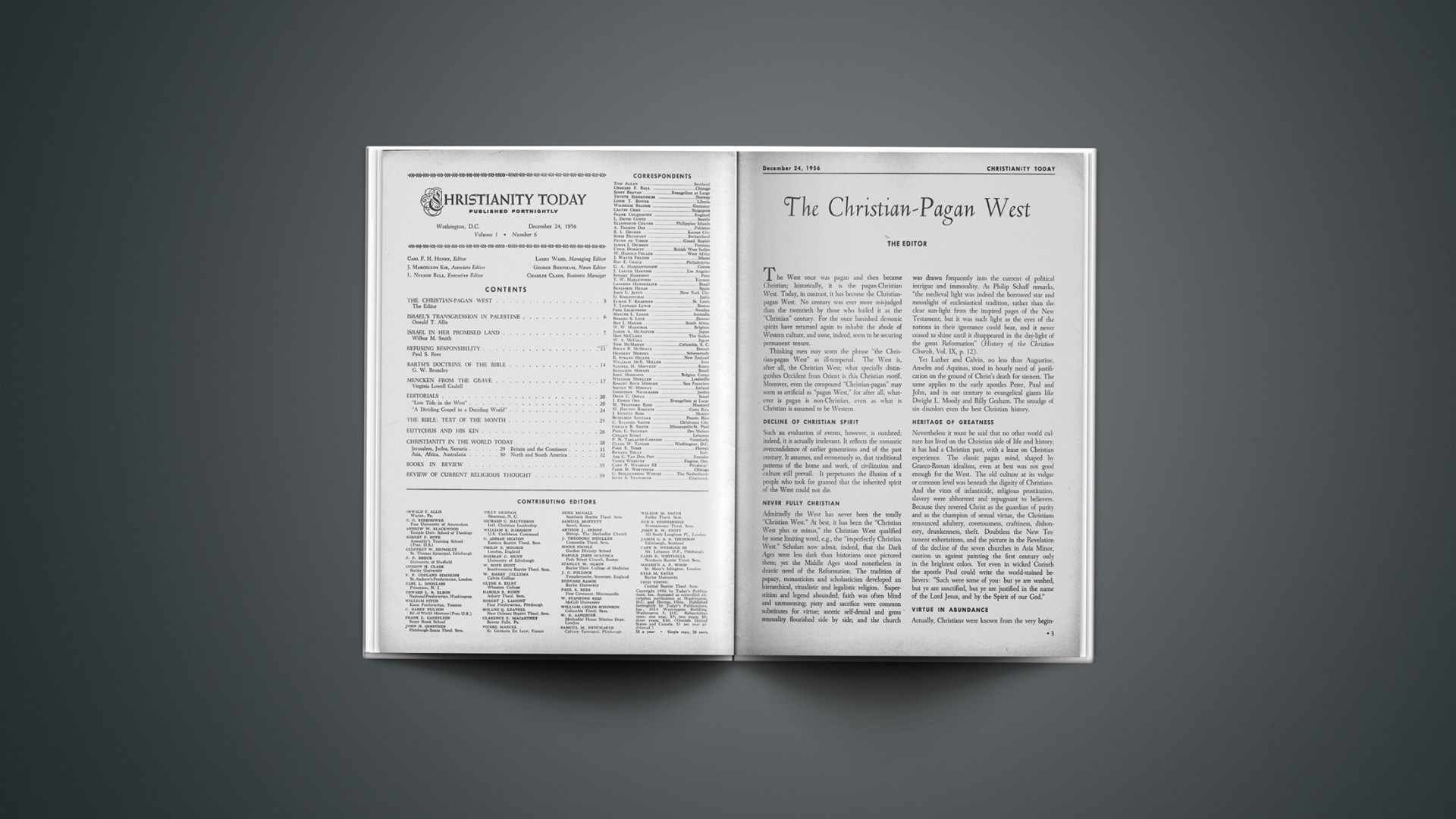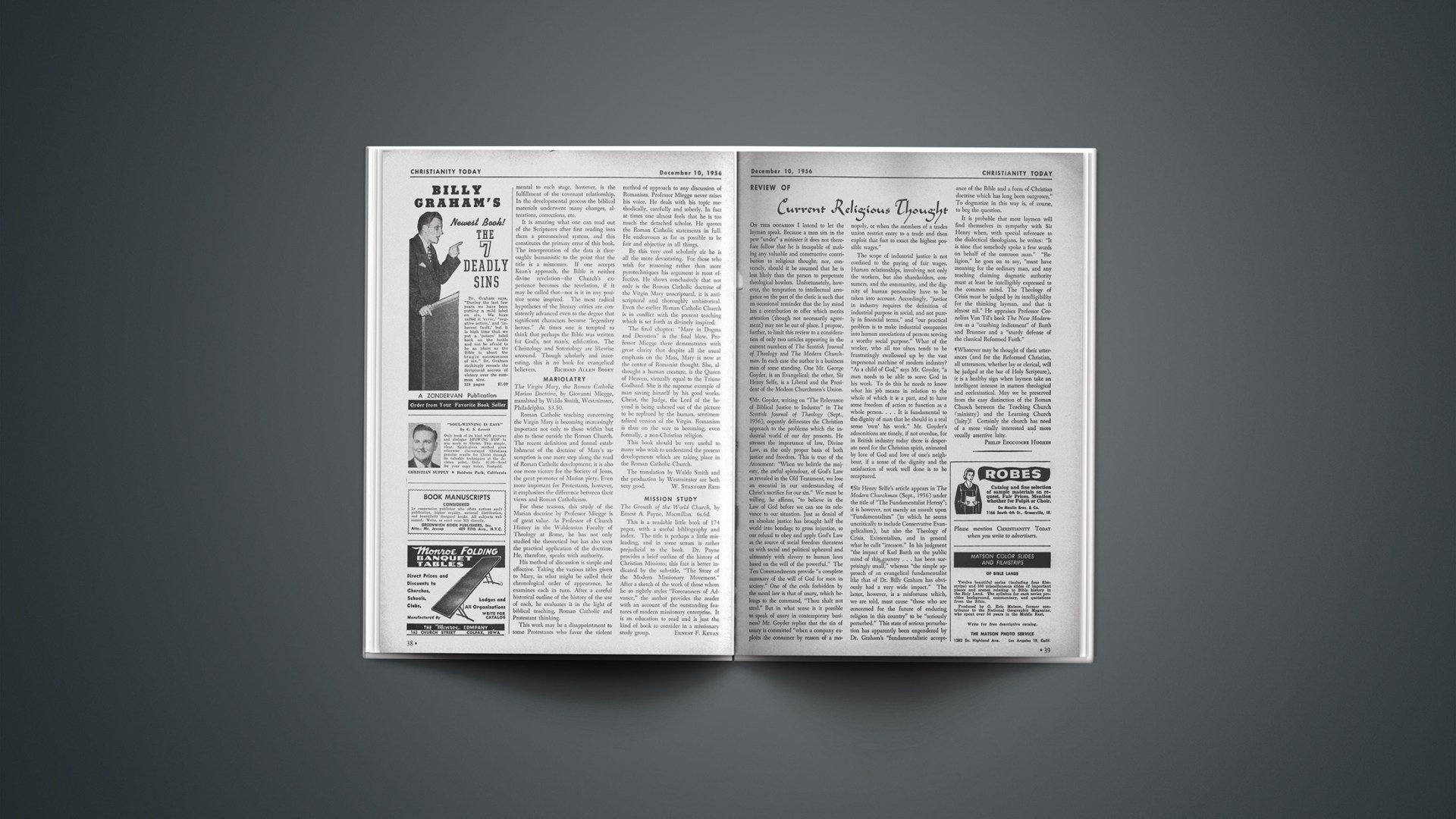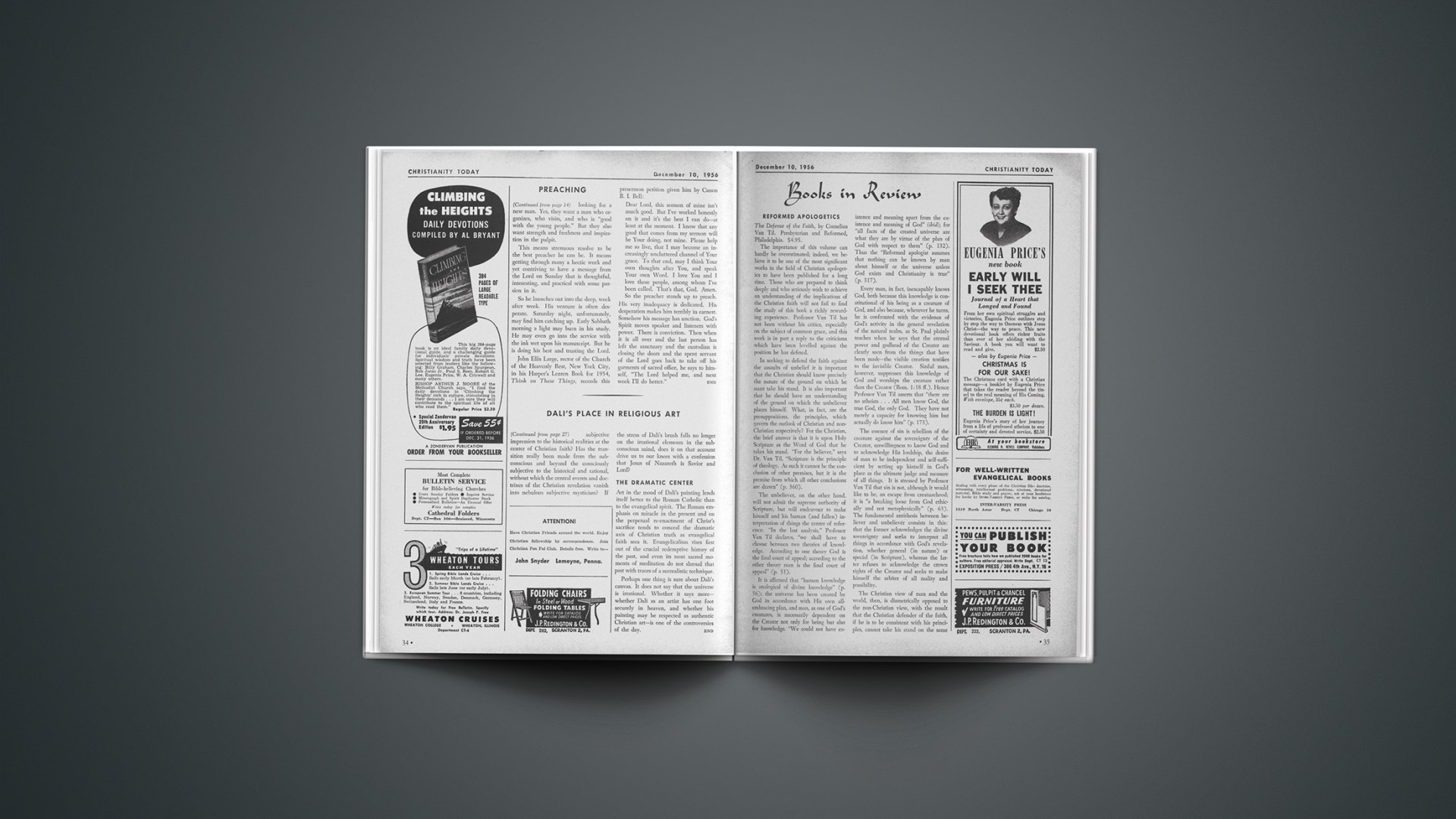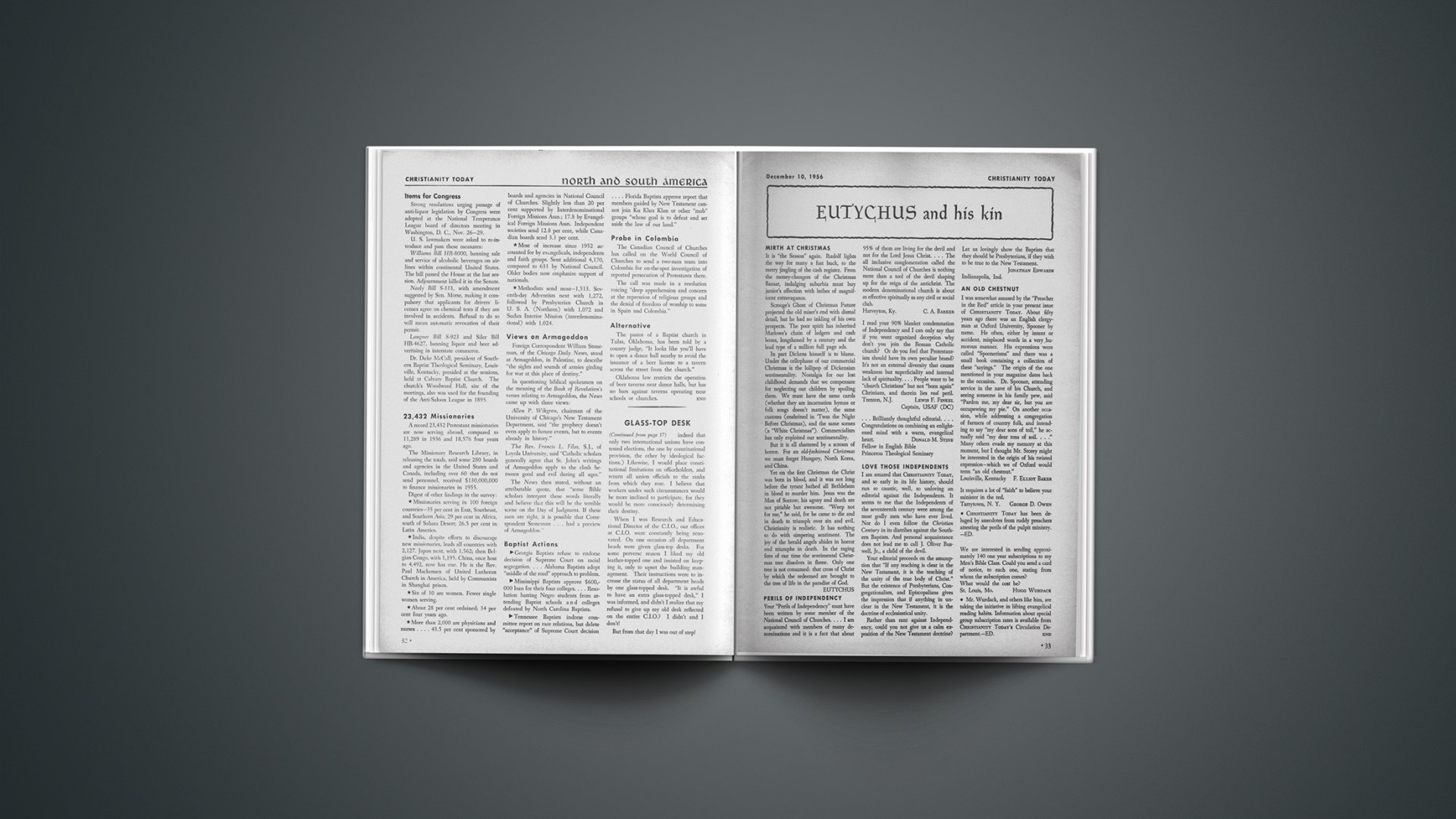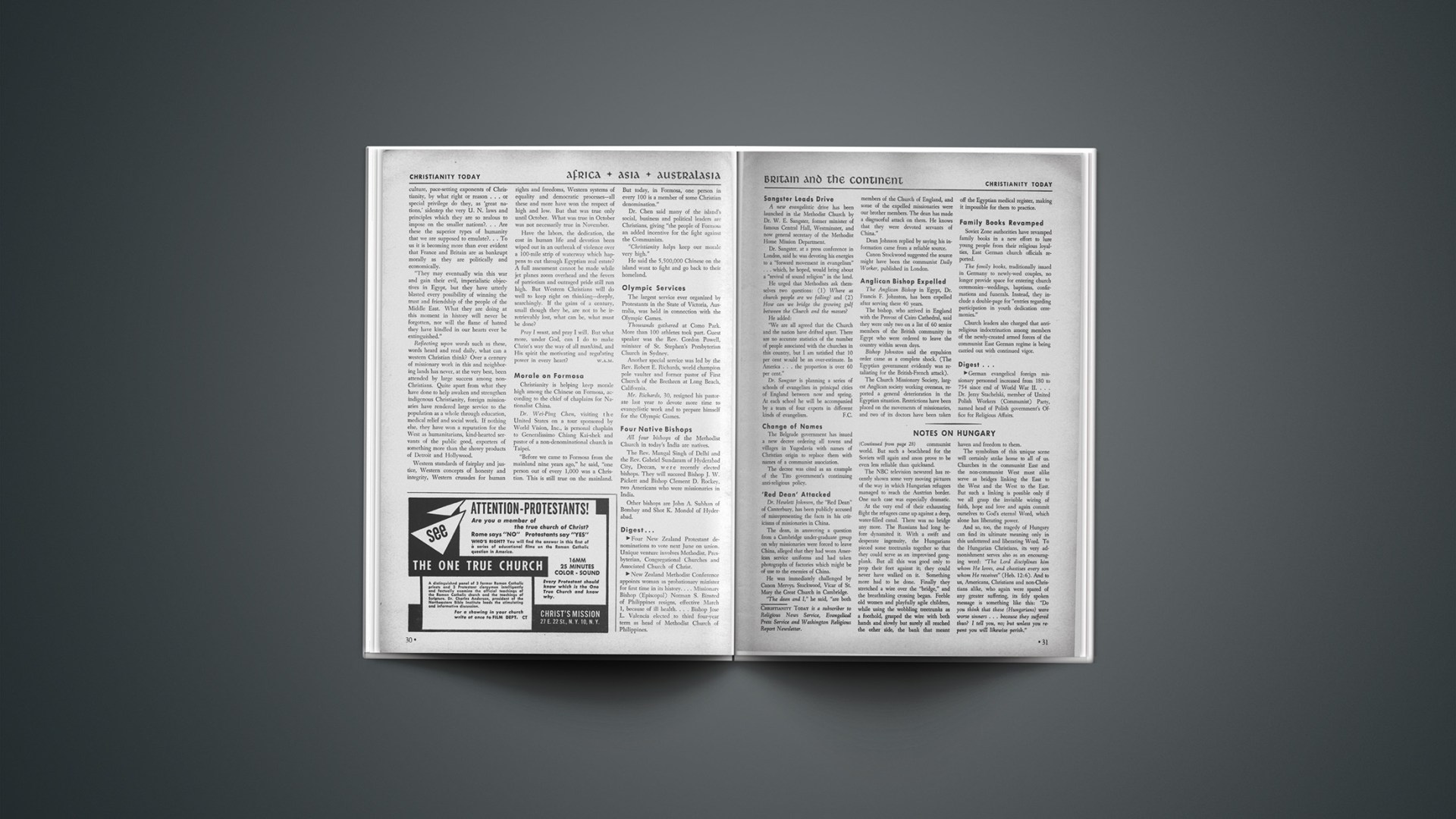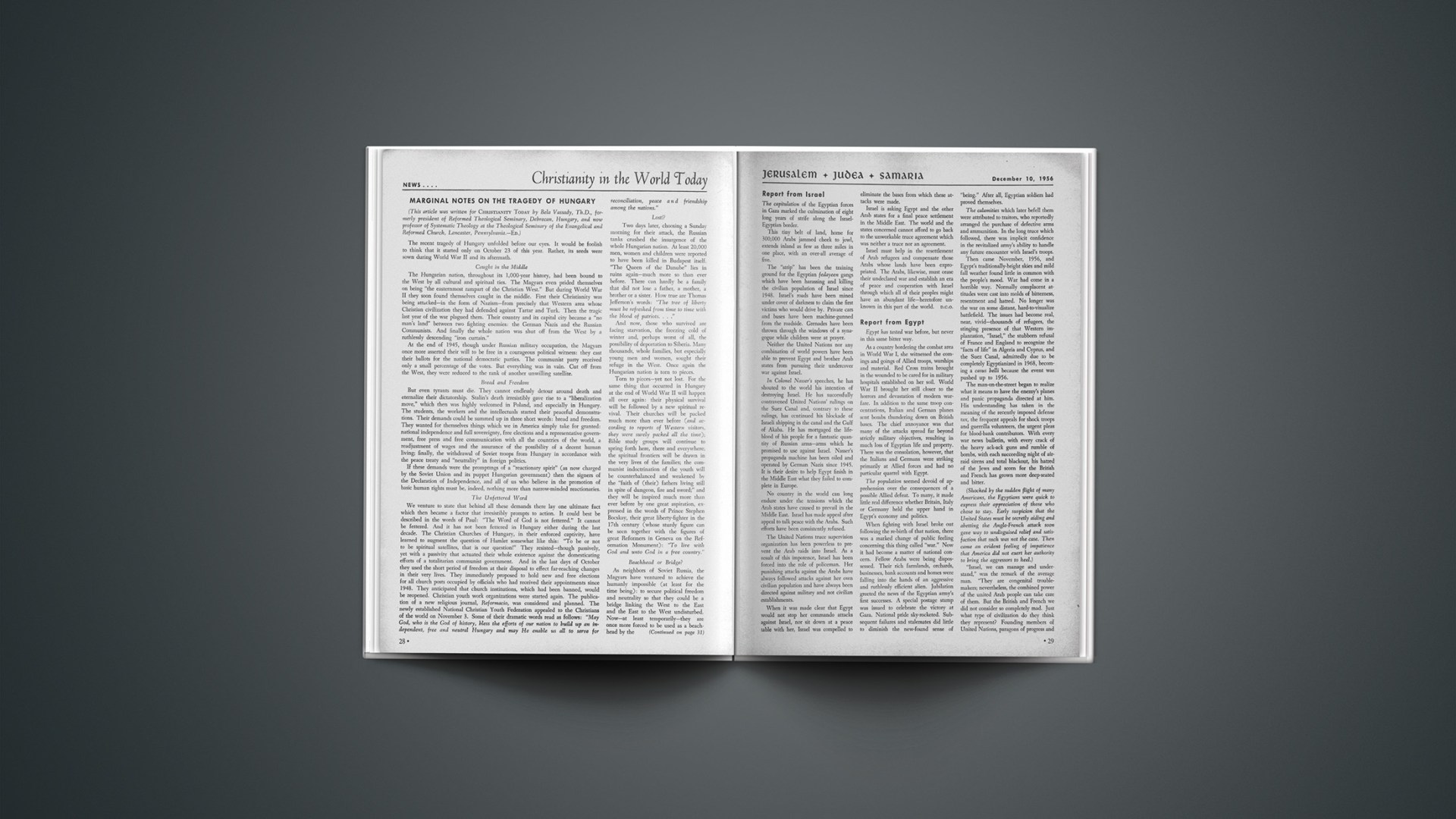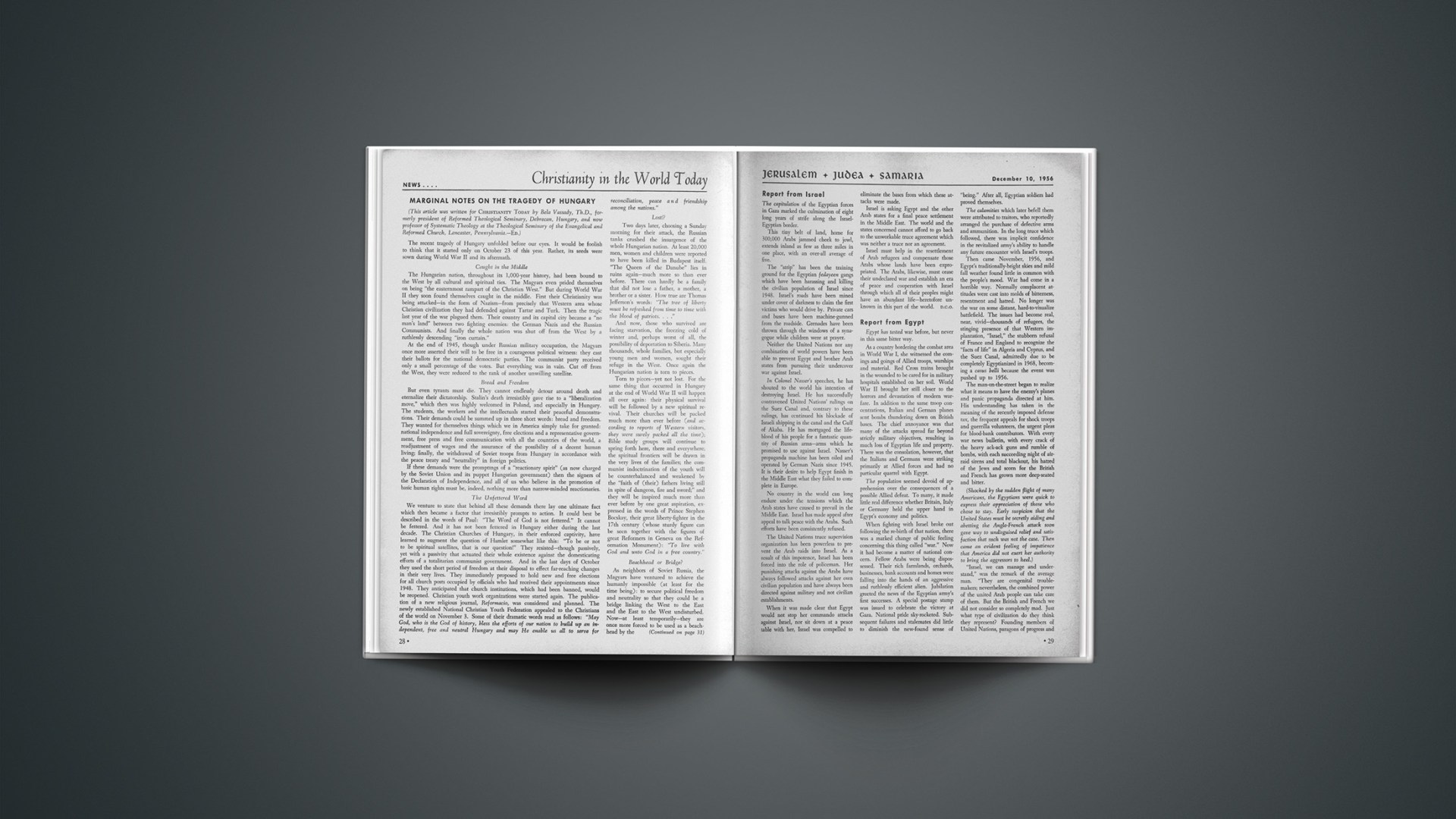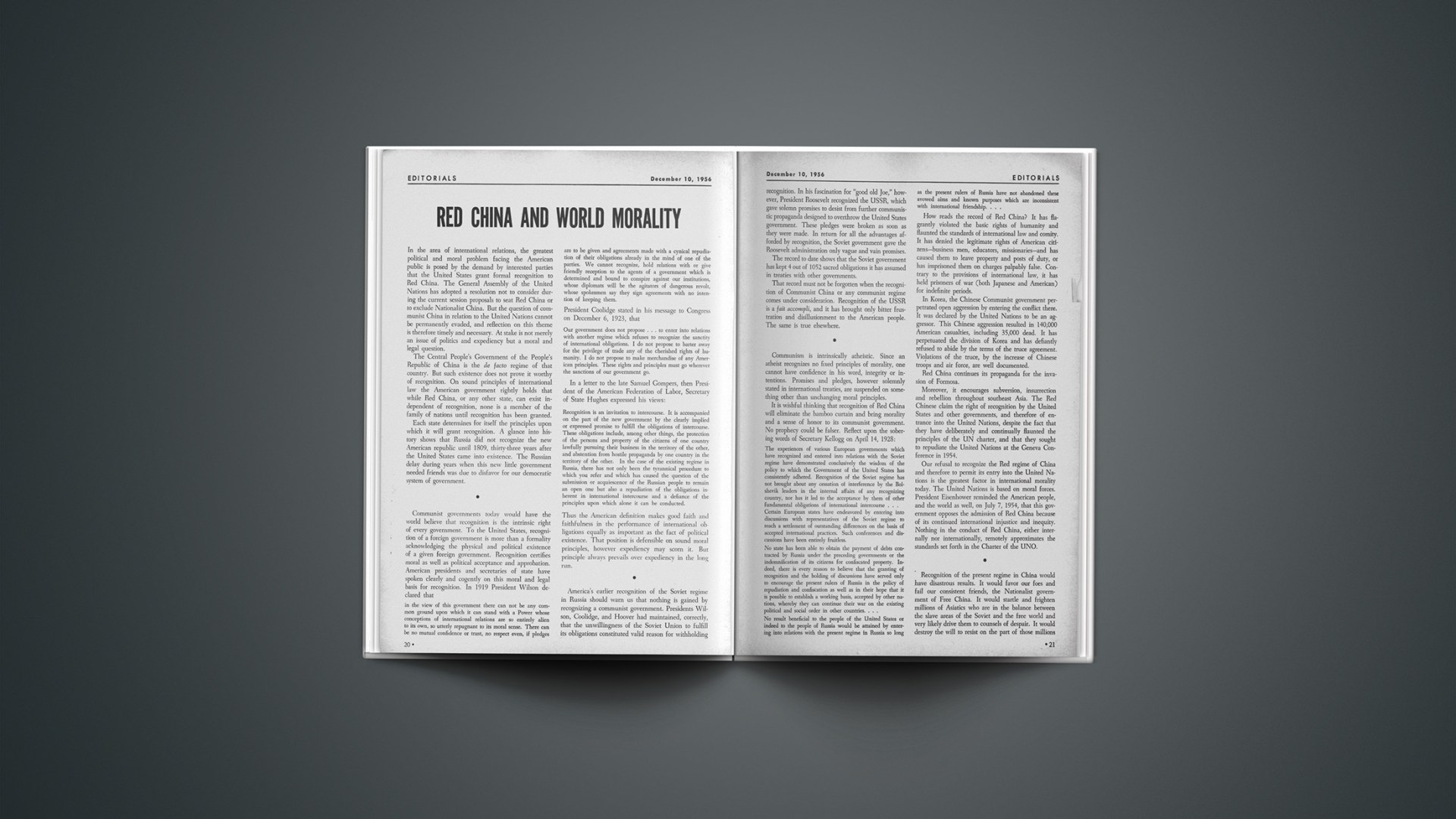The West once was pagan and then became Christian; historically, it is the pagan-Christian West. Today, in contrast, it has become the Christian-pagan West. No century was ever more misjudged than the twentieth by those who hailed it as the “Christian” century. For the once banished demonic spirits have returned again to inhabit the abode of Western culture, and some, indeed, seem to be securing permanent tenure.
Thinking men may scorn the phrase “the Christian-pagan West” as ill-tempered. The West is, after all, the Christian West; what specially distinguishes Occident from Orient is this Christian motif. Moreover, even the compound “Christian-pagan” may seem as artificial as “pagan West,” for after all, whatever is pagan is non-Christian, even as what is Christian is assumed to be Western.
Decline Of Christian Spirit
Such an evaluation of events, however, is outdated; indeed, it is actually irrelevant. It reflects the romantic overconfidence of earlier generations and of the past century. It assumes, and erroneously so, that traditional patterns of the home and work, of civilization and culture still prevail. It perpetuates the illusion of a people who took for granted that the inherited spirit of the West could not die.
Never Fully Christian
Admittedly the West has never been the totally “Christian West.” At best, it has been the “Christian West plus or minus,” the Christian West qualified by some limiting word, e.g., the “imperfectly Christian West.” Scholars now admit, indeed, that the Dark Ages were less dark than historians once pictured them; yet the Middle Ages stood nonetheless in drastic need of the Reformation. The tradition of papacy, monasticism and scholasticism developed an hierarchical, ritualistic and legalistic religion. Superstition and legend abounded; faith was often blind and unreasoning; piety and sacrifice were common substitutes for virtue; ascetic self-denial and gross sensuality flourished side by side; and the church was drawn frequently into the current of political intrigue and immorality. As Philip Schaff remarks, “the medieval light was indeed the borrowed star and moonlight of ecclesiastical tradition, rather than the clear sun-light from the inspired pages of the New Testament; but it was such light as the eyes of the nations in their ignorance could bear, and it never ceased to shine until it disappeared in the day-light of the great Reformation” (History of the Christian Church, Vol. IX, p. 12).
Yet Luther and Calvin, no less than Augustine, Anselm and Aquinas, stood in hourly need of justification on the ground of Christ’s death for sinners. The same applies to the early apostles Peter, Paul and John, and in our century to evangelical giants like Dwight L. Moody and Billy Graham. The smudge of sin discolors even the best Christian history.
Heritage Of Greatness
Nevertheless it must be said that no other world culture has lived on the Christian side of life and history; it has had a Christian past, with a lease on Christian experience. The classic pagan mind, shaped by Graeco-Roman idealism, even at best was not good enough for the West. The old culture at its vulgar or common level was beneath the dignity of Christians. And the vices of infanticide, religious prostitution, slavery were abhorrent and repugnant to believers. Because they revered Christ as the guardian of purity and as the champion of sexual virtue, the Christians renounced adultery, covetousness, craftiness, dishonesty, drunkenness, theft. Doubtless the New Testament exhortations, and the picture in the Revelation of the decline of the seven churches in Asia Minor, caution us against painting the first century only in the brightest colors. Yet even in wicked Corinth the apostle Paul could write the world-stained believers: “Such were some of you: but ye are washed, but ye are sanctified, but ye are justified in the name of the Lord Jesus, and by the Spirit of our God.”
Virtue In Abundance
Actually, Christians were known from the very beginning more for their positive ethical and spiritual performance than for mere abstinence. Pagan observers marveled “how they love one other.” An inexplicable joy irradiated the lives of these ordinary mortals; the peace that became theirs was unknown even to an age free of international hostilities; a boundless flood of kindness and benevolence was turned toward neighbors and strangers; godliness came to live in human flesh. These were a holy people, graced by the Holy Spirit. Acquaintance with the Risen Christ endowed them with a spiritual treasure so surpassingly superb that they laid down their lives rather than renounce Him. Even where totalitarian rulers brandished steel against them, they preferred martyrdom to the sin of silence. They were “called Christians first at Antioch” (Acts 11:26), and they were worthy of His Name. They had a divine commission to go to a perishing world; they were “under orders” to witness of the Redeemer to lost men. Their “conversation”—their walk as well as their words—was halo-bright. The incarnate, crucified, and risen Christ was the meeting place of their hopes and fears. Their marching orders were to confront the world in an armor the pagan empires had never worn. They eclipsed all the previous generations in their embodiment of love, of joy, of peace, of long-suffering, of gentleness, of goodness, of faith, of meekness, of temperance.
Inspiration Of Christianity
All that became noblest in the West was but the lengthened shadow of such faith and life. In a world abounding with religions, biblical Christianity supplied a distinctive view of God and the universe, of man and his destiny. The life of the West came to revolve around the drama of divine incarnation and atonement. The span of human existence was related in every sphere to the God-man who died in the stead of sinners and who rose for them in triumph over death. Between the divine creation of man and the final judgment of the race, the advent of the Redeemer stood as the dominating peak of history. Time “before Christ” lacked any climax; it was a movement of events in which the redemptive promise of God waited fulfillment. “The year of our Lord” became synonymous with the age of grace, in which redeemed men and women were adopted into the family of faith, with the risen Redeemer as their living Head. Since the sixth century the West has based its calendar upon the reality of the incarnation.
While Christian monotheism furnished the lofty inspiration of religion and morality, its influence did not stop there. It shaped literature and the arts. It even furthered the confidence of the West (although contemporary thought arbitrarily obscures this debt) in the unity and rationality of space-time existence, and hence stimulated the growth of science. Christianity upheld the ultimate significance of reason and conscience under God, and it proclaimed as well a providential universe on the basis of divine creation and preservation. Neither ancient polytheistic religion nor philosophical dualism had produced this lively sense of God and the supernatural world, and of man’s awesome destiny.
A Squandered Inheritance
Today this inheritance is all but squandered. No doubt those who disparage life in the Middle Ages as measured by the purity of New Testament religion can make their case, but nonetheless the world today, in contrast with earlier centuries clothed by Christian influences, stands starkly naked in moral shame.
Call it a return to paganism or barbarism or what one will, the fact remains that in the West for three centuries Christian influences upon society, the state and culture have decreased while secular influences have increased to dominating proportions. In the eighteenth century the upper classes of society broke with Christian beliefs, and the unity of Western Christendom vanished. While phantom unity rémained in the balance of power preserved by the absolute monarchies, when these fell, only the myth of the West’s ongoing progress concealed its fragmenting ideals. When progress, in turn, seemed doubtful, only the rise of dictators preserved the outward illusion of unity.
Terrifying Ambiguities
Today’s situation is awesome in its ambiguities. The largest strength of the Communist party, next to Russia and China, is in Italy, home of Vatican City and the organizational head of the largest body of professing Christians. Many who vote Communist still attend Roman Catholic mass in Italy (in contrast with the French).
The Italian Senate’s only woman member, Senator Lina Merlin, has charged that between two and three million women live by prostitution; that in Rome houses of prostitution operate under government license “all over town, and near schools and churches.” Such confusions and contradictions strike ever deeper and deeper in nominally Christian centers today; principle and piety seem ever less and less a central concern of human existence.
The Reformation warned that the Christian West had deteriorated to quasi-Christian foundations, and called for a full and swift return to biblical supports. Scholasticism had one-sidedly emphasized the intellectual element in Christianity. The community it produced repeated the Apostles’ Creed, but without putting heart and soul in the opening word. For Credo (I believe) it tended to substitute Credendum est (it is believed). A generation merely mouthing the creed led to another generation that could not in good conscience even repeat it. The highest language of faith, used first by saintly men, next by carnal men, and then by unregenerate men, at last vanished entirely from the vocabulary of the modern pagan.
Medieval Compromises
The medieval compromise, in fact, reached far beyond matters of doctrine and personal virtue. It involved also a misconception of the social order and of the church’s relation to culture.
In the provocative volume Man in This World, Hans Zehrer reaches back a thousand years to A.D. 1075 and the autocratic Pope Gregory VII’s Twenty-Seven Theses, which led in 1308 to the bull Unam Sanctum as the pivot of the Western revolt against authority. By their own claims the papal despots began to lessen the distance between God and man, and man and God. Drawing the spiritual sword, popes presumed to rule over emperors and their subjects in place of God. “In setting himself in the place of God, the Pope gave the signal for every class to do likewise. ‘Why should you be God and not I?’ is a question before which title-deeds lose their force” (Zehrer, op. cit., p. 67). Thereafter, the man who would be God becomes in swift turn the man freed from all superior authority, who loses at last not merely the image of God, but in doing so loses also the image of man, and descends to bestiality. He becomes the herd man of our era, easily led by totalitarian superiors. In the Christian-pagan West he emerges as the beast-man of evolutionary naturalism, although in actuality he is the man-beast.
Men With Half A Soul
Whatever may be said about Zehrer’s thesis, the fact is that for five centuries, since the mid-fifteenth century yielded to the post-medieval era, the man of Europe and the Americas has stood increasingly confounded and mute in the presence of the Great Questions. His distant forefathers had been heirs of the classic Graeco-Roman world view and prized the Christian inheritance even above that. The death of ancient culture they counted gain because of the birth of a higher. But the modern man, by contrast, gave half his soul to the Renaissance, and was half-hearted toward the Reformation. He now gave snap answers to Ultimate Problems, answers which blurred the Christian motif, and from which all remaining biblical hues, already pallid, would soon fade.
Those who today call merely for “a new Reformation” thereby betray the fact that they judge current history unrealistically. Latin America, perhaps, is a prospect for such a duplication within history. There, as nowhere else, the smoldering revolt against a medieval temper could erupt into a war of ideas, involving Renaissance as well as Reformation claims. But elsewhere the West has already stripped human life of much of its traditional meaning. The inherited patterns of civilization are paling swiftly. Priority Answers of the past are now repudiated, and the Priority Problems along with them. The current failure to grasp the world of ultimates commits man to categories that imply the end of a rational-moral cosmos and the consequent insignificance of reason and the good. For two generations influential philosophers in the once-Christian West have ceased to ask, “Who is God?” “What is the purpose of history, and of the universe?” “How shall we define man’s dignity?” “What are the permanent aspects of truth and morality?” but instead have been asking “Is there a God?” “Does purpose exist in history and the universe?” “Is man essentially unique?” and “Have reason and goodness any objective significance?”
The Drift Downstream
The chorus of intellectual giants answering these questions negatively has swelled. Paraded as the verdict of modern intellectual genius are the dogmas that the binding force of reality is not supernatural and that life and society are held together best if God be dissolved. Confused Western man has been floating downstream on the river of negation, for driftwood requires nothing in the way of spiritual decision. Today, tossed by doubt and uncertainty, modern man is wearying of this world and of himself. His day-to-day existence balances on the sharp edge of chilling questions.
The geographical frontiers of Christendom have shrunk perceptibly. The Russian Orthodox Church and the vast evangelical Stundist movement in the U.S.S.R. eke out their existence by the tolerance of a totalitarian government. The Ukraine, where Roman Catholic congregations date back a millennium, is enslaved behind the Iron Curtain. France, a half-century ago included in every list of nominally Christian great powers, has a bankrupt faith; of its 42 million inhabitants, 35 million no longer attend mass (a mortal sin for Catholics). Only European lands on which the Reformation made a strong theological impact are today virile in their resistance to Communism.
But the shriveling of the Christian claim upon modern thought and life is even more shocking than the shrinking of Christian territorial frontiers. Almost everywhere the West shows a return to pagan ways of thinking and living. Before Christ and before conscience it puts a score of substitute allegiances.
Eroding The Patience Of God
First, the boundless wickedness of the Tigris-Euphrates valley, the cradle of civilization, eroded the patience of God’s Spirit, and the early human enterprise was finally deluged in doom. The new beginning was grounded in revealed religion; the sacred Hebrew narratives carry forward the best of the old history from Abraham to Moses and Sinai, to David and the Hebrew temple, and through the prophets of the Old Testament. Furthermore, they light up this whole venture of faith with Messianic expectation.
Then, the decline of the proud and classic Graeco-Roman civilization ended in the tribal sack and fall of Rome. This extremity of the pagan world became the Christian believer’s opportunity; the weakness of the pagan gods revealed the strength of the Lord of glory.
The third long night of human barbarism seems to have begun. To many observers, the horizon of this third night exhibits little, if any, prospect of a sunrise. Earlier and once benign cultures perished in judgment. The first civilization in the Tigris-Euphrates valley came to naught with the destruction of a generation hardened in its revolt; the glory of the Hellenic world could not withstand its later disintegration and doom. Descending from its pinnacle of lofty achievement, the Christian West in becoming pagan is ¡leaded for inevitable doom. The light men shun today is blinding, for the post-Christian era revolts against the most sacred inheritance of the race. To assume that an anti-Christ culture will escape perdition is sheer madness.

